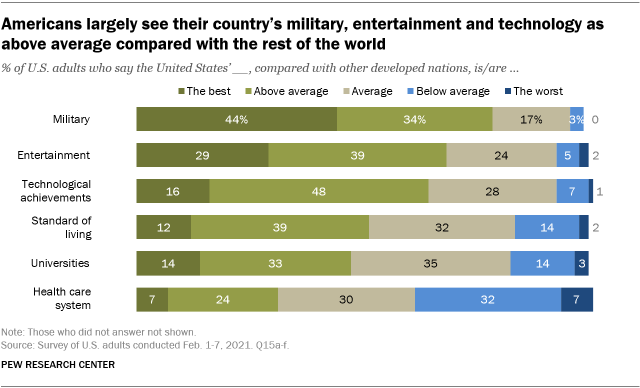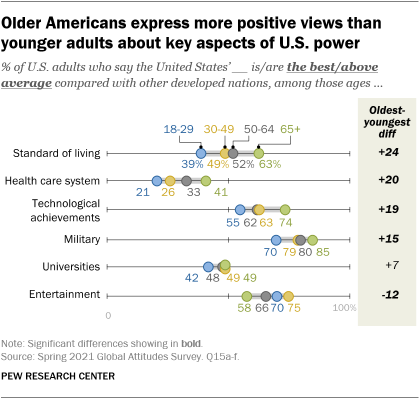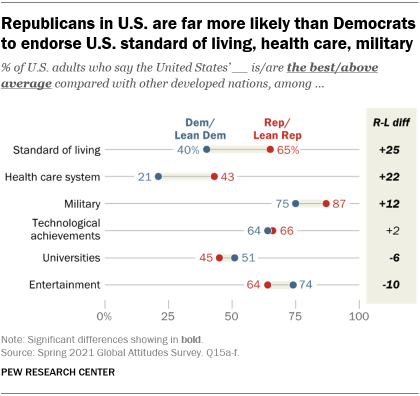Americans don’t always see eye to eye with people in other societies over various dimensions of U.S. “hard” and “soft” power, according to a February Pew Research Center survey of the United States and 16 other advanced economies. While Americans see some aspects of U.S. power more positively than people elsewhere, they offer more negative views in other areas.
When it comes to the U.S. military, for example, 44% of U.S. adults say it’s the best in the world and another 34% describe it as above average. These self-evaluations are slightly rosier than those offered by publics in the other advanced economies surveyed, where, outside of South Korea (42%) and Taiwan (37%), no more than around three-in-ten adults see the U.S. military as the best in the world. Still, large majorities in the U.S. and every other place surveyed describe the American military as at least above average.
This Pew Research Center analysis focuses on comparing attitudes in the United States about American “soft” (e.g. cultural products, technology) and “hard” power (e.g. military) with views in other advanced economies. For non-U.S. data, this post draws on nationally representative surveys of 16,254 adults from March 12 to May 26, 2021, in 16 advanced economies. All surveys were conducted over the phone with adults in Canada, Belgium, France, Germany, Greece, Italy, the Netherlands, Spain, Sweden, the United Kingdom, Australia, Japan, New Zealand, Singapore, South Korea and Taiwan.
In the U.S., we surveyed 2,596 adults from Feb. 1 to 7, 2021. Everyone who took part in the U.S. survey is a member of the Center’s American Trends Panel (ATP), an online survey panel that is recruited through national, random sampling of residential addresses. This way nearly all adults have a chance of selection. The survey is weighted to be representative of the U.S. adult population by gender, race, ethnicity, partisan affiliation, education and other categories.
This study was conducted in places where nationally representative telephone surveys are feasible. Due to the coronavirus outbreak, face-to-face interviewing is not currently possible in many parts of the world.
Here are the questions used for this analysis, along with responses. Visit our methodology database for more information about the survey methods outside the U.S. For respondents in the U.S., read more about the ATP’s methodology.
Around three-in-ten Americans (29%) describe their country’s entertainment products – including movies, music and television – as the best in the world, while another 39% call them above average. Large majorities in every other place surveyed agree that U.S. cultural exports are at least better than average, but only in Greece, Japan, Singapore and Italy are people as likely as Americans to declare the U.S. the global leader.
Americans are notably less positive when it comes to their nation’s technological achievements. Only 16% think U.S. achievements in this area are the best in the world. On this question, people in other countries are slightly more likely to see the U.S. positively. A median of 20% of adults across the 16 other advanced economies say U.S. technology is the best in the world, including 45% in Greece, 38% in South Korea and 31% in Taiwan. While relatively few Americans see their own country’s technological achievements as the world’s best, 64% of U.S. adults see them as at least better than average – a view that is broadly shared across the other surveyed publics (median of 72%).
Americans do not offer especially glowing evaluations of their universities, either. Only 14% call them the best in the world, though another 33% describe them as better than average. Across the other publics surveyed, a median of 59% describe U.S. universities as at least better than average. And in Greece (40%), South Korea (31%), Japan (24%) and Singapore (23%), around a quarter or more describe them as the best in the world.
When it comes to the U.S. standard of living, around half of Americans (51%) describe it as above average or better, including 12% who call it the best in the world. Yet outside of Taiwan (53%), South Korea (52%), Spain (51%) and Greece (47%), people in other advanced economies offer less positive assessments. Across the other 16 places surveyed, a median of only 33% describe the U.S. standard of living as above average or better. In fact, in most places, a plurality describes the American standard of living as solidly “average” – including half who give it this rating in Germany. Around half of the Dutch (47%) and Swedes (53%) call the American standard of living below average or worse.
Few people in any of the advanced economies surveyed – the U.S. included – describe the American health care system as the best in the world. Americans themselves are relatively divided over whether it is better than average (31%), average (30%) or worse than average (39%). Elsewhere, majorities say the American health care system is below average or worse, including one-in-five or more in Australia (24%), Spain (20%) and Belgium (20%) who say the American health care system is the worst in the world.
Views differ by age, income, party affiliation
Younger people tend to evaluate America more positively than older people in some of the advanced economies surveyed. In the U.S., however, the opposite is often true: Older Americans, for example, are more likely than younger adults to describe their nation’s standard of living, health care system, military, technological achievements and universities as above average. Younger Americans, however, are more likely than older adults to see their country’s entertainment products positively.
Across many advanced economies surveyed, people with higher incomes are more likely than those with lower incomes to describe the U.S. as above average across nearly all dimensions asked about – with the notable exceptions of the health care system and the overall standard of living. In the U.S., however, higher-income people are more likely than lower-income people to compliment America’s standard of living.
In the U.S., there are also stark partisan and ideological differences in views about American power. Republicans and independents who lean toward the Republican Party are more likely than Democrats and Democratic leaners to describe America’s health care system, standard of living and military as above average or better. The opposite is true when it comes to universities and entertainment.
Note: Here are the questions used for this analysis, along with responses. Visit our methodology database for more information about the survey methods outside the U.S. For respondents in the U.S., read more about the ATP’s methodology.







